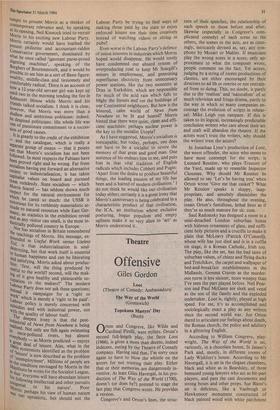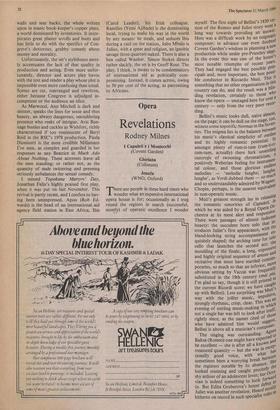Theatre
Offensive
(Theatre of Comedy: Ambassadors).
The Way of the World (Greenwich)
Topokana Martyrs' Day • (Bush)
OOrton and Congreve, like Wilde and Pirelli, were stylists. Orton's second full-length play, the farce Loot (1966), is given a more than decent, indeed indecent, outing by the Theatre of Comedy company. Having said that, I'm sorry once again to have to blow the whistle on the actors for not trusting their play. Either that or their memories are dangerously in- ventive. At least Giles Havergal, in his pro- duction of The Way of the World (1700), doesn't (or does he?) pretend to stage the last play that Congreve wrote. He provides a version.
Congreve's and Orton's lines, the struc-
ture of their speeches, the relationship of each speech to those before and after, likewise (especially in Congreve's com- plicated comedy) of each scene to the others, the scenes to the acts, are as cunn- ingly, intricately devised as, say, any sym- phony by Mozart or Mahler. If musicians play the wrong notes in a score, only ap- proximate to what the composer wrote, people comment on the fact. Yet actors, judging by a string of recent productions of classics, are either encouraged by their directors to ad lib or rewrite or not restrain- ed from so doing. This, no doubt, is partly due to the 'realism' and 'naturalism' of so much television and fringe drama, partly to the way in which so many companies en- courage the evolution of scripts in rehear- sal: Mike Leigh run rampant. If this is taken to its logical, increasingly predictable conclusion writers who care about their art and craft will abandon the theatre. If the actors won't trust the writers, why should the writers trust the actors?
In Jonathan Lynn's production of Loot, the worst offender, the actor who seems to have most contempt for the script, is Leonard Rossiter, who plays Truscott of
the Yard, made up to resemble Inspector Clouseau. Why should Mr Rossiter be allowed to say 'Let's be having you' when Orton wrote 'Give me that casket'? What Mr Rossiter speaks is sloppy, inap- propriate, and unsubtly diminishes the play. He also, throughout the evening, treats Orton's fastidious, lethal lines as if they're so much manure for sit. corn.
Saul Radomsky has designed a room in a semi-detached London suburban house with hideous ornaments of glass, and suffi- cient holy pictures and a crucifix to make it plain that McLeavy (Patrick O'Connell), whose wife has just died and is in a coffin on stage, is a Roman Catholic, Irish too. The play, like the set, has the bad taste of suburban values, of chintz and flying ducks and Tretchikov, the carpet and wallpaper of bed-and-breakfast establishments in the Midlands. Gemma Craven as the murder- ous nurse is less sinister, more woopsy than I've seen the part played before. Neil Pear- son and Paul McGann are sleek and venal as the son of the family and the exploded undertaker. Loot is, rightly, played at high speed. For me, it's as accomplished and sociologically exact a play as any written since the second world war. Joe Orton dared to articulate our feelings about death, the Roman church, the police and adultery in a glittering English.
According to William Congreve, play- wright, The Way of the World is set, variously, in a chocolate house, St James's Park and, mostly, in different rooms of Lady Wishfort's house. According to Mr Havergall, it is set in the elegant chambers, black and white as in Beardsley, of three bemused young lawyers who act as bit-part players, and pass the cast documents and strong boxes and other props. Sue Blane's set is delicious, like a Vanbrugh or Hawksmoor monument constructed of black painted wood with white parchment
walls and seat backs, the whole written upon in manic book-keeper's copper plate, a world dominated by inventories. It incor- porates great plaster scrolls and busts and has little to do with the specifics of Con- greve's dexterous, grubby comedy about money and morality.
Unfortunately, the set's stylishness mere- ly accentuates the lack of that quality in production and acting. Even more unfor- tunately, director and actors play havoc with the text and render a play whose plot is impossible even more confusing than usual. Scenes are cut, rearranged and rewritten, either because Congreve is adjudged in- competent or the audience an idiot.
As Marwood, Ann Mitchell is dark and sinister, speaks the lines for sense and thus beauty, an always dangerous, smouldering presence who reeks of intrigue. Avis Bun- nage bustles and cackles as Wishfort, richly characterised if too reminiscent of Beryl Reid in the RSC's 1978 production. Paula Dionisotti is the most credible Millamant I've seen, as complex and guarded in her responses as any Beatrice in Much Ado About Nothing. These actresses leave all the men standing; or rather not, as the quantity of male twittering and preening seriously unbalances the sexual comedy.
I missed Topokana Martyrs' Day, Jonathan Fa!la's highly praised first play, when it was put on last November. This revival is partly recast, and I confess to hav- ing been unimpressed. Apoo (Rob Ed- wards) is the head of an international aid agency field station in East Africa, Ibis
(Carol Leader), his Irish colleague. Ramifies (Yemi Ajibade) is the dominating local, trying to make his way in the world by any means: he steals, and seduces Ibis during a raid on the station, Jabu Mbalo is Julius, with a spear and religion, an ignoble savage three-quarters naked. There is also a hen called Wanker. Simon Stokes directs rather slackly, the set is by Geoff Rose. The play, I think, is meant to be condemnatory of international aid as politically com- promising. Instead, it comes across, owing to 50 per cent of the acting, as patronising to Africans.















































 Previous page
Previous page